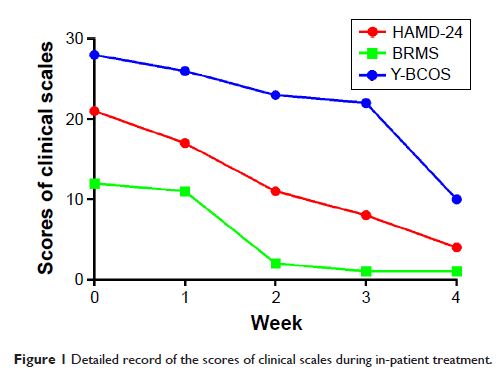109568
论文已发表
注册即可获取德孚的最新动态
IF 收录期刊
- 3.4 Breast Cancer (Dove Med Press)
- 3.2 Clin Epidemiol
- 2.6 Cancer Manag Res
- 2.9 Infect Drug Resist
- 3.7 Clin Interv Aging
- 5.1 Drug Des Dev Ther
- 3.1 Int J Chronic Obstr
- 6.6 Int J Nanomed
- 2.6 Int J Women's Health
- 2.9 Neuropsych Dis Treat
- 2.8 OncoTargets Ther
- 2.0 Patient Prefer Adher
- 2.2 Ther Clin Risk Manag
- 2.5 J Pain Res
- 3.0 Diabet Metab Synd Ob
- 3.2 Psychol Res Behav Ma
- 3.4 Nat Sci Sleep
- 1.8 Pharmgenomics Pers Med
- 2.0 Risk Manag Healthc Policy
- 4.1 J Inflamm Res
- 2.0 Int J Gen Med
- 3.4 J Hepatocell Carcinoma
- 3.0 J Asthma Allergy
- 2.2 Clin Cosmet Investig Dermatol
- 2.4 J Multidiscip Healthc

阿立哌唑 (Aripiprazole) 在强迫症和躁郁症控制中的疗效增强作用:有自杀企图的案例分析
Authors Lai J, Lu Q, Zhang P, Xu T, Xu Y, Hu S
Received 14 September 2016
Accepted for publication 25 November 2016
Published 28 December 2016 Volume 2017:13 Pages 87—90
DOI https://doi.org/10.2147/NDT.S122316
Checked for plagiarism Yes
Review by Single-blind
Peer reviewers approved by Prof. Dr. Roumen Kirov
Peer reviewer comments 2
Editor who approved publication: Professor Wai Kwong Tang
Abstract: Comorbid obsessive–compulsive disorder (OCD) and bipolar disorder (BD)
have long been an intractable problem in clinical practice. The increased risk
of manic/hypomanic switch hinders the use of antidepressants for managing
coexisting OCD symptoms in BD patients. We herein present a case of a patient
with BD–OCD comorbidity, who was successfully treated with mood stabilizers and
aripiprazole augmentation. The young female patient reported recurrent
depressive episodes and aggravating compulsive behaviors before
hospitalization. Of note, the patient repetitively attempted suicide and
reported dangerous driving because of intolerable mental sufferings. The
preexisting depressive episode and OCD symptoms prompted the use of paroxetine,
which consequently triggered the manic switching. Her diagnosis was revised
into bipolar I disorder. Minimal response with mood stabilizers prompted the
addition of aripiprazole (a daily dose of 10 mg), which helped to achieve
significant remission in emotional and obsessive–compulsive symptoms. This case
highlights the appealing efficacy of a small dose of aripiprazole augmentation
for treating BD–OCD comorbidity. Well-designed clinical trials are warranted to
verify the current findings.
Keywords: aripiprazole,
bipolar disorder, obsessive–compulsive disorder, suicide
